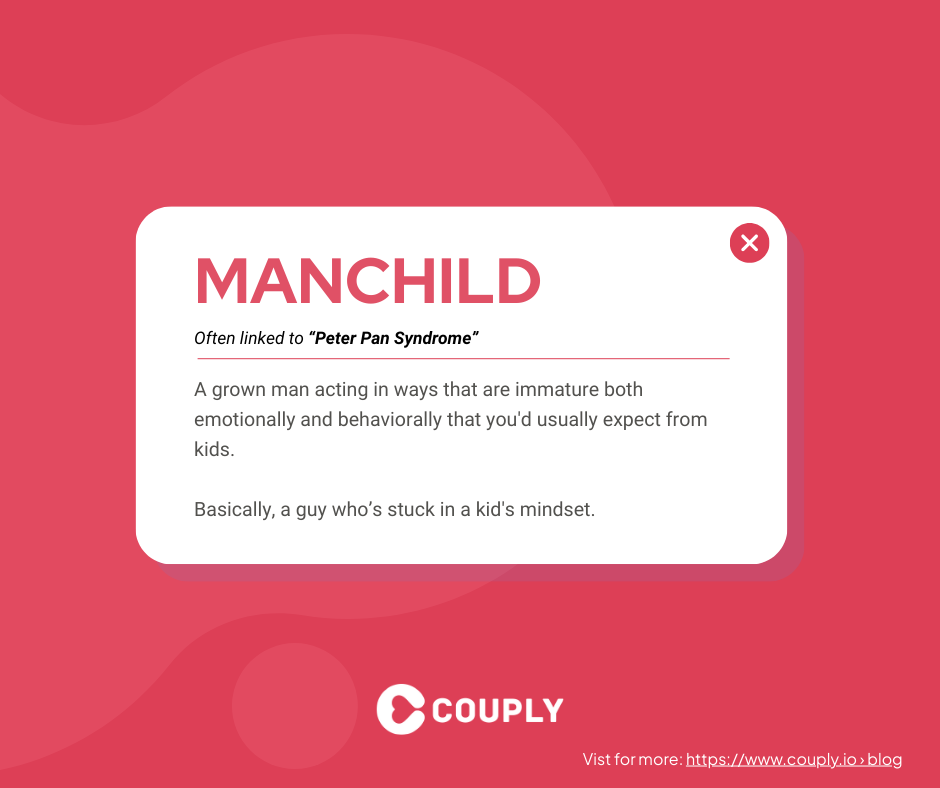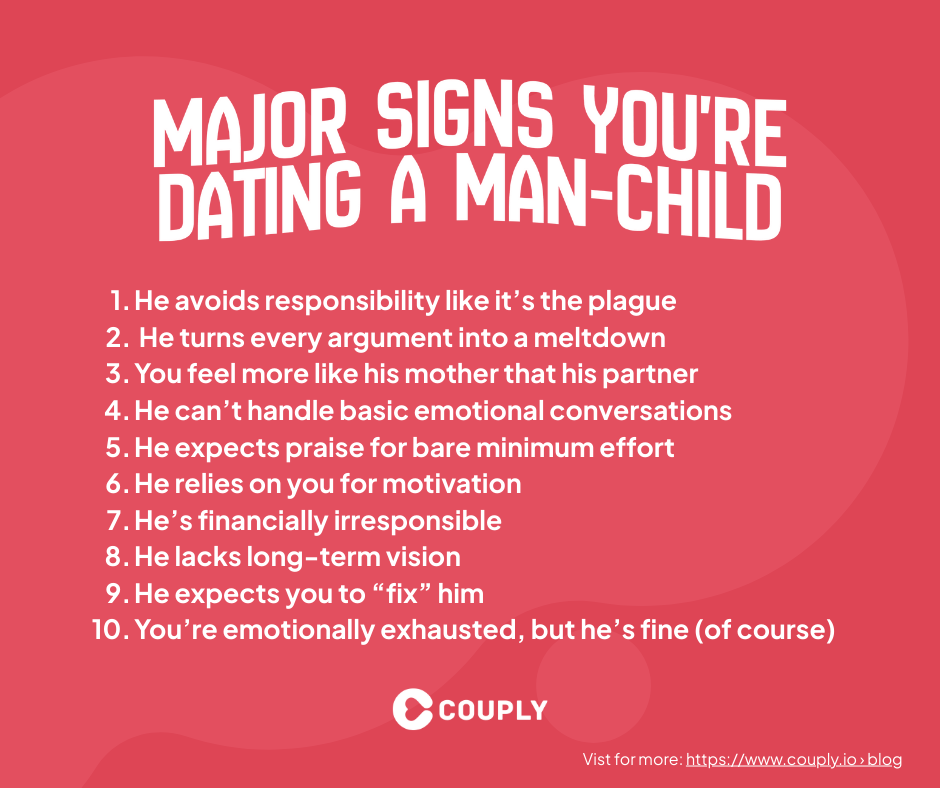There’s this moment in a relationship when you catch yourself doing something that doesn’t quite sit right. Maybe you’re picking up his socks off the floor again. Or gently reminding him—for the third time—to call his landlord. Or worse, sitting in your car after a fight, realizing you sound more like his mother than his girlfriend.
And then, it hits you.
You’re not building a life with him. You’re managing his.
If that sounds familiar, Sabrina Carpenter’s song “Man-Child” probably hits too close to home. That cheeky, self-aware anthem nails what it feels like to love someone who acts like a grown man in theory, but emotionally? He’s still stuck in boyhood. She sings about wanting a partner who knows what he wants, not another project she has to fix. It’s witty, playful, and painfully relatable—because so many women have lived that same lyric.
A “man-child” relationship doesn’t start as chaos. It begins with charm. He’s spontaneous, carefree, fun—the kind of guy who makes you feel alive. But over time, that carefree turns careless. You start carrying the emotional weight. You remind, explain, teach, rescue. You become the safety net for someone who never learned how to catch himself.
And before you know it, love doesn’t feel romantic anymore—it feels like work.
But here’s the twist: you’re not weak for ending up in this kind of dynamic. Many emotionally intelligent, nurturing women do. Why? Because what looks like patience, empathy, and strength easily blurs into over-functioning, rescuing, and self-neglect.
This blog isn’t here to drag men or shame women. It’s here to decode a pattern—why “man-child” relationships happen, how to spot them, and how to break the cycle without losing your softness.
Because loving someone shouldn’t feel like parenting. And the moment it does, it’s time to wake up to what that’s costing you.
What Is a “Man-Child” and Why Does It Happen?

A “man-child” isn’t about age. He can be 22 or 42. It’s about emotional development—the gap between physical adulthood and emotional responsibility.
A man-child looks like an adult but often behaves like a teenager who never grew up. He might have a job, an apartment, or even a beard, but emotionally? He’s still figuring out how to handle life without being babysat.
So why does this happen?
1. Childhood conditioning
Many men were never taught emotional regulation. They were told to “toughen up,” so instead of learning to manage feelings, they avoided them. Over time, avoidance became a coping style—and eventually, a lifestyle.
2. Learned helplessness
When someone constantly rescues you—parents, girlfriends, or even friends—you never learn to self-regulate or take responsibility. If his mom used to handle everything, he might unconsciously look for a partner to continue that role.
READ: How to Spot and Deal with Weaponized Incompetence in Relationships
3. Unequal social expectations
Society often praises women for being nurturing but gives men a pass for being “laid-back.” This imbalance teaches women to fix, manage, and care—while men often skate by emotionally unchecked.
4. Comfort over growth
Maturity requires discomfort. Man-children avoid that. They’d rather stay in emotional comfort zones than face tough conversations, accountability, or change.
The result? Relationships that feel like caregiving. You’re the responsible one, while he floats through life with minimal effort—and maximum excuses.
Major Signs You’re Dating a Man-Child

So how do you know if your partner falls into this category? Here are the clearest signs you’re dating a man who still emotionally lives in Neverland.
1. He Avoids Responsibility Like It’s the Plague
Whether it’s forgetting deadlines, skipping chores, or letting bills pile up—responsibility feels like a foreign language to him. He often blames others (“My boss is toxic,” “The system’s unfair”) instead of taking accountability.
You might notice that you’re constantly cleaning up his mess—literally and emotionally. Maybe you’re handling logistics, keeping track of appointments, or reminding him about things he should remember himself.
Over time, this shifts the relationship balance. You’re the adult, he’s the dependent. And the emotional labor? All on you.
2. He Turns Every Argument into a Meltdown
Man-children don’t handle conflict—they spiral in it. When faced with tension, they often react with defensiveness, sulking, or withdrawal.
You bring up something serious, like “We need to talk about our finances,” and suddenly he’s sighing, stonewalling, or accusing you of nagging. He might even storm off or shut down emotionally, forcing you to chase comfort and resolution.
Healthy adults can regulate emotions during disagreements. Man-children crumble, making every issue about their discomfort instead of shared problem-solving.
3. You Feel More Like His Mother Than His Partner
Do you find yourself packing his lunch, scheduling his dentist appointments, or cleaning up after his bad days? That’s not partnership—it’s parenting.
He might lean on you for motivation or guidance, but when it becomes constant, it’s emotional labor disguised as love. You end up managing his emotions, responsibilities, and decisions, while your needs fade into the background.
If you’re exhausted after every interaction because you’re always the one managing things, you’re not being loved equally—you’re being parented in reverse.
4. He Can’t Handle Basic Emotional Conversations
Ask him how he feels, and you get: “I don’t know.”
Ask him what he wants from the relationship, and you get: “Let’s not overthink.”
Man-children avoid emotional depth like it’s quicksand. Vulnerability scares them. Emotional honesty feels too heavy. So they deflect with humor, distractions, or even sex to avoid real talk.
You’ll know you’re dealing with this when serious conversations always end up sidetracked, or when he minimizes your emotions by calling you “too sensitive.”
5. He Expects Praise for Bare Minimum Effort
He takes out the trash once and expects a standing ovation. He helps around the house and waits for your “thank you.”
A man-child often views equality as extra credit. He believes basic adult responsibilities deserve gold stars because deep down, he hasn’t accepted that maturity means shared effort, not applause.
This can be frustrating because you’re over-functioning while he’s under-functioning—and both of you end up resentful.
6. He Relies on You for Motivation
You’re his therapist, cheerleader, and personal manager rolled into one. He depends on you to hype him up for job applications, to push him toward his goals, or to regulate his self-esteem.
At first, it feels flattering—he values your opinion. But later, it becomes suffocating. His progress hinges on your energy, and when you stop providing it, everything collapses.
Real adults self-motivate. Man-children outsource it.
7. He’s Financially Irresponsible
He’s always “waiting for the next big opportunity” but never budgeting or saving. Maybe he spends impulsively, ignores bills, or relies on you to pick up the slack.
Money conversations often trigger defensiveness, guilt-tripping, or avoidance. And if you’ve ever caught yourself covering his expenses, that’s a flashing red flag.
Financial immaturity is emotional immaturity wearing a wallet.
8. He Lacks Long-Term Vision
Man-children often live in the “now.” Planning the future—career, finances, family—feels too big, too far, too real.
He might shrug off future talks or say, “Let’s see what happens.” Meanwhile, you’re craving stability and direction. The relationship becomes stagnant, with you pushing for progress while he drifts.
Without a shared vision, love feels like it’s idling.
9. He Expects You to “Fix” Him
He’s aware of his flaws—maybe even jokes about them—but never actually works on them.
He’ll say, “I’m bad with emotions,” or “I’m not good at responsibility,” and then expect you to accommodate rather than change.
You become the fixer, while he stays comfortably broken. And the more you repair, the more he resists growth, because deep down, your efforts enable his inertia.
10. You’re Emotionally Exhausted, But He’s Fine
Here’s the biggest sign of all: you feel drained, while he feels content.
Man-children thrive when others manage their chaos. You, on the other hand, feel unseen and underappreciated. It’s not that he doesn’t love you—he probably does in his own way—but love without accountability isn’t partnership. It’s dependency disguised as intimacy.
Why You Might Stay Longer Than You Should
Leaving a relationship that feels unbalanced isn’t always a matter of logic. If it were, you’d walk away the first time you realized you were carrying the emotional, financial, and mental load alone. But the truth is, staying often has less to do with love—and more to do with conditioning.
You don’t stay because you’re blind. You stay because your heart is loyal, hopeful, and wired to nurture.
Let’s break down the deeper reasons why women often stay longer than they should with a man-child—because understanding the “why” is what helps you finally move toward the “how” of letting go.
1. You Believe in His Potential
You’ve seen flashes of who he could be—the focused version of him, the kind one, the funny one who makes you feel safe and seen. Those moments convince you he’s capable of more. You think, If he could stay that version of himself, we’d be perfect.
So you hold on. You make excuses for inconsistency. You mistake potential for progress.
But potential isn’t partnership. Loving who he might become keeps you trapped in a relationship that only exists in theory. Meanwhile, you’re the only one doing the emotional heavy lifting to make that “someday” happen.
2. You’ve Been Conditioned to Nurture, No Matter What
From a young age, women are taught to care. You learned to anticipate others’ needs, smooth over discomfort, and hold relationships together. So when your partner struggles, your instinct is to fix, guide, and protect.
But that same empathy can turn into emotional overwork. You start absorbing his problems, regulating his moods, and calling it “love.” The truth? That’s not love—it’s survival.
Healthy relationships don’t require self-sacrifice. They require shared effort.
3. You Confuse Codependency with Closeness
When you’re in a relationship with a man-child, dependency becomes disguised as intimacy. You mistake being needed for being loved.
He leans on you for emotional stability, decision-making, or even motivation, and that can feel intoxicating at first. You feel important, irreplaceable. But over time, you realize it’s not mutual. You’re the emotional anchor—and anchors don’t move.
The bond starts to feel more like obligation than connection.
4. You Fear Starting Over
Leaving means facing the unknown. It means rewriting the story you’ve been clinging to. It means admitting that love alone isn’t enough. And that can be terrifying.
You tell yourself, Maybe things will get better after this fight. Maybe he’ll change. But every time, the cycle resets. The apology comes, the charm returns, and the pattern repeats.
Starting over feels harder than staying put. But in truth, staying in a draining relationship is the slowest form of heartbreak there is.
5. You’ve Internalized the “Fixer” Identity
Maybe you’ve always been the one who holds everyone together—the emotional rock, the one people lean on. Being that person gives you a sense of purpose. It feels powerful to be strong, capable, dependable.
So when you meet someone who’s lost or immature, something in you lights up. I can help him, you think. But what starts as empowerment turns into exhaustion. Because no matter how much you fix, the relationship still feels one-sided.
The truth is, you’re not meant to be anyone’s emotional rehabilitation center. You’re meant to be a partner, not a savior.
6. You Normalize Dysfunction
When you’ve been in the dynamic long enough, chaos feels familiar. You start lowering the bar to survive. You stop expecting him to change, and instead, you adjust.
You tell yourself things like:
- “At least he’s not cheating.”
- “He’s trying, in his own way.”
- “No relationship is perfect.”
But lowering your standards doesn’t make love sustainable—it makes it smaller.
Love that constantly drains you isn’t love. It’s maintenance.
7. You Confuse Patience with Endurance
Patience is waiting for growth you can see. Endurance is staying in pain hoping it’ll someday turn into peace. Many women stay because they’re proud of their capacity to endure. They see it as strength.
But strength isn’t about staying no matter what—it’s about knowing when “enough” has been reached.
Letting go doesn’t make you weak. It makes you honest.
8. You Fear Being Labeled the “Bad Guy”
Women are often shamed for walking away. You worry he’ll say you “gave up,” or that mutual friends will paint you as heartless. You replay the good times to convince yourself leaving is unfair.
But love isn’t a morality test. You’re allowed to leave when you’re no longer growing. You’re allowed to stop mothering a man who refuses to mature. You’re allowed to prioritize peace over potential.
9. You Mistake Emotional Chaos for Passion
Man-children can be charismatic, fun, spontaneous—there’s a thrill in unpredictability. They can make you laugh, keep you on your toes, and make every day feel like an adventure.
But drama is not depth. Highs and lows don’t equal love. If every good moment is followed by tension, guilt, or exhaustion, that’s not chemistry—that’s trauma bonding.
Real love is calm. Steady. Mutual.
10. You Hope He’ll “Grow Up” Once You Prove You’re Worth It
This is the quiet heartbreak of many strong women: believing love can inspire maturity. You think if you’re patient enough, kind enough, or supportive enough, he’ll finally see what he has and step up.
But growth doesn’t come from someone else’s effort—it comes from internal desire. You can love him with your whole being, and it still won’t make him ready to meet you emotionally.
The hardest truth? Love can’t teach accountability. Only experience can.
When you stay longer than you should, it’s not because you’re foolish. It’s because you love deeply—and you believed in the version of him you saw glimpses of. But your love isn’t meant to raise someone. It’s meant to meet someone.
Walking away doesn’t mean you stopped caring. It means you stopped carrying.
And when you finally do, you’ll realize the emotional space you were giving to his growth was actually meant for your own.
How to Break the Man-Child Cycle Without Losing Yourself
If you’ve realized you’re in this dynamic, there’s a way out—one that doesn’t require resentment or rage. It requires boundaries, self-awareness, and a shift from nurturing to empowering.
1. Stop Overfunctioning
The more you do, the less he learns. Step back. Let him handle his own responsibilities. If he forgets something—let the consequence happen.
Natural consequences teach faster than reminders ever will.
2. Communicate Like an Equal, Not a Parent
Stop the “Did you remember to…” tone. Speak as an equal.
Try: “We both need to handle our parts for this to work.”
It’s not about control—it’s about partnership.
3. Reinforce Accountability
Instead of enabling, hold space for responsibility. When he blames others, ask: “What could you do differently next time?”
Emotional growth begins where excuses end.
4. Rebuild Your Own Boundaries
Boundaries aren’t punishments—they’re self-respect in action. Decide what behaviors you’ll no longer accommodate, and stick to them.
If he truly wants to grow, he’ll adjust. If not, you’ll have clarity instead of confusion.
5. Seek Emotional Reciprocity
A healthy relationship is mutual. You both listen, support, and share the weight of emotional labor.
If you’re always the strong one, that’s not balance—that’s burnout.
6. Invest in Self-Reconnection
When you’ve been mothering a partner, you lose sight of yourself. Reconnect with your own needs, interests, and support systems.
Emotional independence is your reset button.
The Emotional Cost of Dating a Man-Child
Loving someone who refuses to grow creates emotional fatigue. You start questioning your worth, your expectations, even your sanity.
But the cost isn’t just exhaustion—it’s erosion.
Erosion of trust.
Erosion of desire.
Erosion of who you used to be before love became labor.
You deserve a partner who stands beside you, not behind you. Someone who manages their emotions, takes initiative, and meets you halfway.
Partnership should feel like shared gravity, not constant lifting.
Here’s the truth no one tells you: You can love someone deeply and still realize they’re not ready to love you back in an adult way.
A relationship isn’t healthy when one person carries all the emotional weight. You’re not his therapist, mother, or life coach—you’re his partner. And that means you deserve reciprocity, effort, and emotional maturity.
Growth is a choice, not a wish.
And the moment you stop parenting your partner, you give both of you the chance to evolve—for real this time.
Never mistake codependency for closeness.
Healthy love doesn’t drain you—it grows with you.








